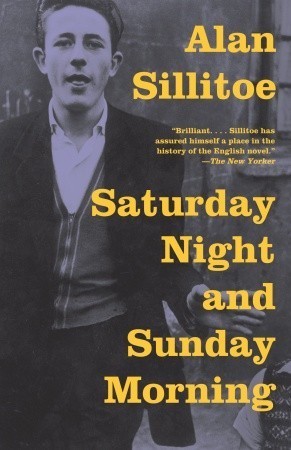What do you think?
Rate this book


256 pages, Paperback
First published January 1, 1958
For it was Saturday night, the best and bingiest glad-time of the week, one of the fifty-two holidays in the slow-turning Big Wheel of the year, a violent preamble to a prostrate Sabbath. Piled-up passions were exploded on Saturday night, and the effect of a week’s monotonous graft in the factory was swilled out of your system in a burst of goodwill. You followed the motto of ‘be drunk and be happy’, kept your crafty arms around female waists, and felt the beer going beneficially down into the elastic capacity of your guts.
The rowdy gang of singers who sat at the scattered tables saw Arthur walk unsteadily to the head of the stairs, and though they must all have known that he was dead drunk, and seen the danger he would soon be in, no one attempted to talk to him and lead him back to his seat. With eleven pints of beer and seven small gins playing hide-and-seek inside his stomach, he fell from the top-most stair to the bottom.





“Aquel mismo día, un año antes, había venido aquí con Brenda y se había caído por las escaleras como si fuera una bola de nieve tras beberse siete ginebras y once pintas. Vaya noche fantástica. Tenía el recuerdo guardado en lo más hondo de su corazón.”“Sábado por la noche, Domingo por la mañana”, un título magnífico para una magnífica novela que es un retrato magnífico de Arthur Seaton, un joven inmaduro de clase obrera en la Inglaterra de los años 50. Un individuo dominado por una rabia ingobernable que dilapida bebiendo y acostándose con mujeres y peleándose con sus maridos. Un cabrón que quiere joder al mundo porque el mundo pretende hacer lo mismo con él, pero que no ambiciona en modo alguno transformarlo en otra cosa.
“Ya sé qué caras tendré en mente cada vez que dispare mi reluciente rifle. Sí. ¡Las de los cabrones que me pusieron el arma en las manos! … tat-tat-tat-tat-tat-tat. Y también veré otras caras: la del cabrón comemocos que se lleva mis impuestos, la del cerdo bizco que nos cobra el alquiler, la del hijoputa cabezón que me saca de quicio cuando me pide que vaya a reuniones del sindicato o que firme un papel contra lo que está sucediendo en Kenia. ¡Como si me importase una mierda Kenia!”Un mundo del que no espera ni persigue progreso social alguno, y en el que su única pretensión es salir adelante de la mejor forma posible y sin remilgo alguno acerca del camino a tomar,
< i>“Eres un listillo, Arthur. Nunca has sabido la diferencia entre lo que está bien y lo que está mal.—Bueno —dijo él—, sí que la sé. Ese es el problema, si te digo la verdad, porque saber la diferencia no sirve para nada.”Arthur Seaton disfruta de un buen sueldo que se gasta en bonitos trajes con los que acudir los sábados al “cálido mundo de los pubs y las chicas ruidosas de vida alegre”, preferentemente casadas, y que ello le sirva de combustible para su mente en los largos días de trabajo frente al torno o en sus solitarias jornadas de pesca. Se mantiene fiel a un curioso código ético que le mueve a ayudar a un desconocido borracho tirado en la calle, y así evitar su detención por la policía, aunque ello no le impida echar un vistazo a su cartera. No hay atisbos de solidaridad obrera, aunque es muy consciente de su situación de clase
“Tipos con trajes y bombines nos dirán: «Estos chicos tienen sus televisores, dinero suficiente para vivir, pisos de protección oficial, y los fines de semana les damos cerveza y les dejamos jugar una partidita de billar… Algunos hasta tienen coches. Los tenemos bien contentos a todos. ¿Cuál es el problema entonces?”y mantiene una leve esperanza de insurrección, aunque solo sea por la perspectiva de la pelea.
“Un día ladrarán y nosotros no iremos tras ellos al redil como borregos. Un día encenderán sus luces y darán palmadas diciendo: «Venga, chicos. Poneos en fila y coged vuestro dinero. No vamos a dejaros morir de hambre». Pero quizá algunos de nosotros decidamos morirnos de hambre, y ahí empezará el problema.”A medida que avanza la novela, y tras algún que otro desagradable incidente, esta rebeldía de sábado por la noche va a ir reconduciéndose en la conformidad de domingo por la mañana. Su fobia a las etiquetas, al compromiso, a la responsabilidad, van atemperándose con las necesidades que supuestamente caracterizan la madurez: el amor, la familia, la estabilidad. Y entonces llegamos al chico-conoce-chica, una buena chica en la que vislumbra a aquella que cuidará bien de sus hijos, le tendrá la casa reluciente y con la que mantendrá, eso cree, su espíritu díscolo e independiente que le impedirá convertirse en su padre, trabajador orgulloso de poder disfrutar de una televisión que le aleje por algunas horas de todos sus problemas, un aparato maravilloso capaz también de ayudar a su hermana a olvidar los palos que le propina su marido.
“For it was Saturday night, the best and bingiest glad-time of the week, one of the fifty-two holidays in the slow-turning Big Wheel of the year, a violent preamble to a prostrate Sabbath. Piled up passions were exploded on Saturday night, and the effect of a week's monotonous graft in the factory was swilled out of your system in a burst of goodwill. You followed the motto of 'be drunk and be happy,' kept your crafty arms around female waists, and felt the beer going beneficially down into the elastic capacity of your guts.”